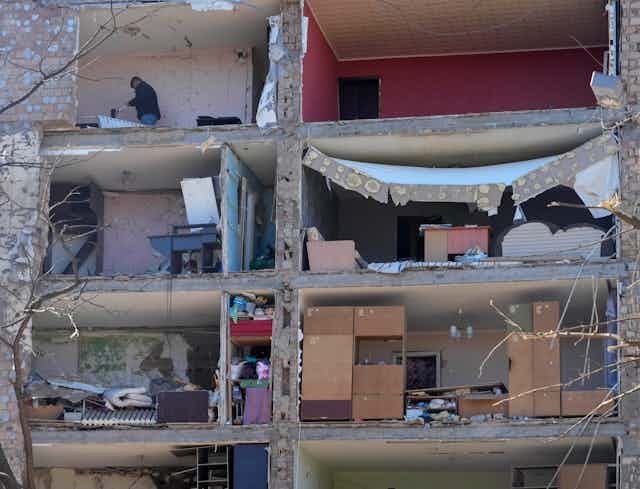As we all watch the horrific crisis unfolding in Ukraine, many of us are asking: What’s the best way to send money to Ukrainians to do the most good?
The answer has just become more complicated than ever.
The conflict in Ukraine has generated a new way to transfer money to Ukrainians directly: Airbnb bookings by people who do not intend to use them. It’s a trend that is “going to be very disruptive for charities,” says Kate Bahen, managing director of Charity Intelligence Canada (CIC), which measures the impact of charities.
In a Twitter post on March 11, 2022, Airbnb CEO Brian Chesky wrote that 434,000 nights had been booked so far on the platform, equivalent to $15 million transferred to hosts within Ukraine – a quarter of the amount donated to the Canadian Red Cross as of March 10, excluding government-matched amounts.
About trust and speed
Bahen says an advantage of giving funds directly to Ukrainians is that it empowers them to use funds as they see fit. “It’s about trust. It’s dignified; there are no strings attached,” she says.
And this is not the first time Canadian donations are going directly into people’s bank accounts. During the 2016 wildfire in Fort McMurray, Alta., the Canadian Red Cross arranged almost $50 million in direct cash transfers for those fleeing their homes.

University of Guelph social scientist Ryan Briggs points to the method’s other strengths: the speed of money transfer, the high credibility of the platform and that benefactors are emotionally rewarded for helping specific people — “something many of us find very motivating.”
‘100 per cent efficient’
“You can think of it as 100 per cent efficient,” says Steve Killelea, founder of the Institute for Economics and Peace, an Australian-based research organization.
But despite its efficiency, there is little research on the use of commercial services to make cash transfers in this way, says Briggs.
Bahen says we can look to organizations that have been directly transferring cash to people in developing countries for years. One such organization, GiveDirectly, writes that when given direct transfers, “people use cash in impactful and creative ways.”
Most of the research GiveDirectly references is on longer-term initiatives in developing countries. A 2017 multiple-study analysis showed that unconditional cash transfers “may improve some health outcomes.” A 2016 literature review also found that cash transfers increased household spending, school attendance and the use of health facilities while decreasing poverty and gender-based abuse by a male partner.
But by United Nations standards, Ukraine is considered highly developed and may not qualify to be lumped in the same category.
Questioning charities’ impact
From CIC’s work, Bahen estimates that 40 per cent of Canadian charitable giving “doesn’t have a high impact” due to inefficient organizations and high overheads.
And there is little correlation between an organization’s impact and dollars received. According to one list, Canada’s most impactful charities, such as the Against Malaria Foundation of Canada and the Canadian Foodgrains Bank, are not among those that receive the most donations.
Physician and humanitarian response educator Kirsten Johnson says that charities too often “end up deciding what people get and it’s not necessarily what they need.” She says that they should be more accountable and reveal where money is spent.

Airbnb cash transfers poorly targeted?
While some charities have an accountability issue, unused Airbnb bookings have the problem of being poorly targeted, says Briggs. Killelea agrees: “It’s probably not going to the poorest people in Ukraine.”
Furthermore, in order to use the funds, Bahen says, recipients need functioning markets — something that Ukraine may not have right now. “Cash will only help if there’s something to buy,” writes Washington-based Anit Mukherjee, a policy fellow at the Center for Global Development.
Another concern is that platforms aiming to directly connect donors with affected people are prone to cyber-threats, fraud and misdirection of funds, says an official for the humanitarian arm of the U.S. State Department.
As an example, according to one recent media report, funds could be inappropriately diverted to people outside of Ukraine who manage properties in Ukraine.
Alternatives
Briggs says if people simply want to do the most good per dollar spent, the Airbnb idea “will never beat donations of anti-malarial bed nets” or any top development charity listed by GiveWell, a company that researches the impacts of charities and their cost-effectiveness.
But Johnson says funding an acute disaster response requires a distinct approach because more co-ordination from stakeholders needs to occur. “This isn’t development; this is a war,” she says of Ukraine, “and health-care interventions in emergency situations save lives.”
Finally, Briggs says the most efficient way of helping may actually be free: Canadians can write letters to their MPs requesting help for Ukrainians who seek refuge in Canada.

